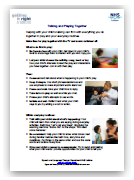
Helping with your child’s talking can fit in with everything you do together in play and your everyday routines.
Make time for play together with the TV and music switched off.
What to do first in play
Be face-to-face with your child. Get down to your child’s level to encourage them to interact with you and copy you.
Let your child choose the activity, song, book or toy. Use your child’s interests to lead the play and interactions you have together. Join in with their play.
Then…
• Comment and talk about what is happening in your child’s play.
• Keep it simple. Use short phrases/sentences and use emphasis to make important words stand out.
• Pause and wait. Give your child time to reply.
• Take turns in play as well as while you chat.
• Praise your child’s attempts to use words.
• Imitate and add. Reflect back what your child says to you by adding a word or action.
Within everyday routines:
Talk with your child about what’s happening: Your child will learn from what you are saying during everyday activities. Bath time: ‘Let’s get your towel’. Emptying the washing machine: ‘Socks out’. At the shops: ‘We need some bananas.’
Be consistent: Help your child to know what comes next during familiar routines like bath time, story time and mealtimes. Do things in the same order and use the same words and actions every time.
Give your child a reason to communicate: Try to avoid anticipating what your child wants: provide opportunities for your child to tell you.
For more information from a local Speech and Language Therapist, click here.
Watch our Vimeo video Tips for Developing Communication Skills.





